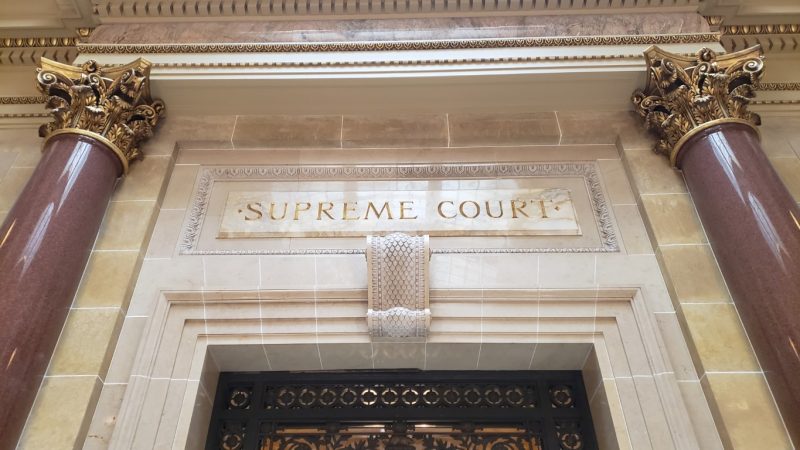State Supreme Court justices quizzed an Evers administration attorney on the legality of an order limiting indoor capacity at bars and restaurants in light of an earlier high court decision affirming lawmakers had oversight over a similar order.
The questioning yesterday was led primarily by the court’s three-member liberal wing, who wrestled with why the October order shouldn’t be considered the same as the extended stay-at-home directive the Supreme Court nixed in May. Liberal justice Ann Walsh Bradley noted the ruling found no DHS act or order was exempt from the definition of a rule.
“To me, it says no order is exempted from the definition. In other words, all are included in the definition,” she said.
But she noted that the decision included two footnotes creating such exemptions, including one granting the agency authority to close schools. She asked how to reconcile that with the text of the order.
>> WisPolitics is now on the State Affairs network. Get custom keyword notifications, bill tracking and all WisPolitics content. Get the app or access via desktop.
Assistant Attorney General Colin Hector, representing the Evers administration, argued that in overturning the extended Safer at Home order, the court found DHS’ view of the law gave it “unfettered discretion or a sort of a blank check to impose public health interventions” without legislative oversight.
“There’s no unfettered discretion here,” he said. “The law says precisely what the agency can do: forbid public gatherings; and sets forth the criteria under which that authority can be exercised to control outbreaks or epidemics.”
But attorney Misha Tseytlin arguing on behalf of the plaintiffs, an Amery tavern and Pro-Life Wisconsin, accused DHS of trying to make an “end-run around the Legislature.”
“My friend, again, representing the same agency in the same pandemic, is attempting to get this court to take another bite of the apple, frankly cynically because my friend believes that the composition of this court has changed,” he said.
Conservatives held a 5-2 majority on the court when it struck down the extended stay-at-home order. Since then, liberal Jill Karofsky defeated conservative Daniel Kelly to narrow the conservative advantage to 4-3.
Tseytlin also argued there was no distinction to be made between DHS Secretary Andrea Palm’s October order and the order overturned by the court in May. Under the doctrine of stare decisis, a legal principle that finds past precedent is binding, he said Palm’s October order should have been presented to lawmakers.
Conservative Justice Brian Hagedorn, who in recent months has been the swing vote in siding with the court’s liberals in a series of election cases, indicated Tseytlin’s point on precedent resonated with him.
“We have a decision of this court that directly addresses the same fact scenario and to turn on that now would be to undercut many of the principles that we’ve laid out and the way we conduct ourselves as an institution,” he said.
The controversy stems from Palm’s October order limiting indoor, public gatherings to 25 percent capacity for a four-week period that expired Nov. 6.
The Tavern League challenged the order, arguing it violated the high court’s ruling striking down the extended Safer at Home directive. The league argued the new order should’ve been issued through the state’s administrative rules process under the ruling, giving the Legislature oversight of the directive.
A Barron County judge initially ruled in October Palm still had the power to issue the new directive under the Supreme Court’s May ruling without going through the administrative rules process. But after Amery tavern The Mix Up and Pro-Life Wisconsin intervened in the suit and appealed to the 3rd District, a split appeals court in November ruled the Supreme Court’s May ruling barred Palm from issuing a new directive.
While the October order has now expired, the Evers administration appealed the decision. In a November filing, the administration indicated Palm and DHS wanted to issue another order in an effort to combat COVID-19 but believe “they could not currently do so” because of the appeals court’s ruling.


